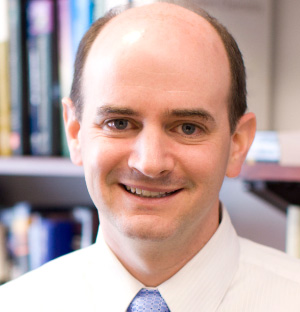Greg Engel Molecular Engineering/Chemistry
Research
Research in the Berggren Center focuses on novel quantum sensors to probe biological system at the nanoscale while laying the foundation to facilitate widespread adoption of these technologies across biology. To create these sensors, we need to understand coherent dynamics, excited state reactivity, non-radiative relaxation, and dephasing.
In my group, we explore materials and biological systems that can be optimized to exploit manifestly quantum mechanical phenomena to drive coherent energy transfer, to steer trajectories through conical intersections and to protect long-lived quantum coherence. To probe these systems, we design new femtosecond spectrometers and microscopes to observe how electronic states couple to one another much the way COSY NMR explores nuclear spin coupling. Exploiting this analogy, we recently developed the first optical analog to MRI for rapid detection electronic couplings.
The Berggren Center is strongly interdisciplinary; graduate students matriculate through Chemistry, Molecular Engineering, Physics, and the Biophysical Sciences while postdoctoral scholars have PhDs in Chemistry, Engineering, Biology, or Physics. Engel and his group members collaborate with physicists, biologists, engineers, and corporate partners to develop new technologies and new science.
Life Outside the Laboratory
Greg enjoys spending time with his family, hiking in the Driftless region of Wisconsin, cross country skiing (he's not any good), and competitive shooting.
Bio
Born: 9/23/1977, West Chester, PA, USA.
Princeton University, A.B., 1999
Harvard University, A.M., 2001
Harvard University, Ph.D., 2004
Harvard University, Postdoctoral Scholar, 2004-2005
University of California, Berkeley, Postdoctoral Fellow, 2005-2007
University of Chicago, Professor, 2007-
Accolades
- 2019 Bernstein Lecturer, UCLA
- 2017 & 2018 World Economic Forum Young Scientist
- 2016-2017 Chair, ACS Physical Chemistry (PHYS) Division
- 2016 Vannevar Bush Fellow (DoD)
- 2014 DoD NSSEFF Award
- 2013 FACSS Innovation Award
- 2013 Defense Science Study Group Member for 2014-2015
- 2012 Llewellyn John and Harriet Manchester Quantrell Award for Undergraduate Teaching
- 2012 Dreyfus Teacher-Scholar Award
- 2012 Sloan Research Fellowship
- 2012 Coblentz Award
- 2010 DTRA Young Investigator Award
- 2010 DARPA Young Faculty Award
- 2009 PECASE Recipient
- 2009 Searle Scholar
- 2008 AFOSR Young Investigator Program
- 2007 Scientific American Top 50 Leaders in Research
- 2007 Camille and Henry Dreyfus New Faculty Award
- 2005-2007 Miller Research Fellow
- 2003-2004 EPA STAR Fellow
- 1999-2002 NSF Graduate Research Fellow
- 1994 Eagle Scout
Recent News from The Berggren Center
Harper Lecture 6/5/2025
Alex Pearson, Greg Engel, and Julian Solway give a Harper Lecture for the UChicago Community.
Inaugural co-Directors Named 6/5/2025
Greg Engel and Julian Solway named inaugural co-Directors of the Berggren Center.



